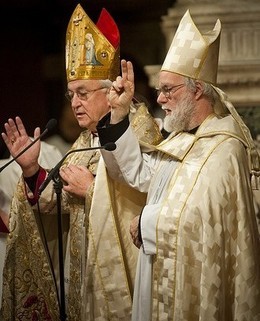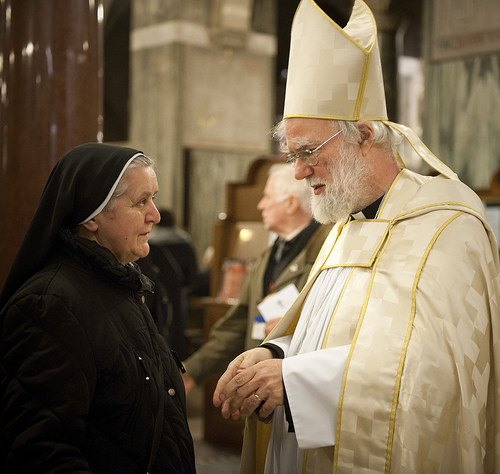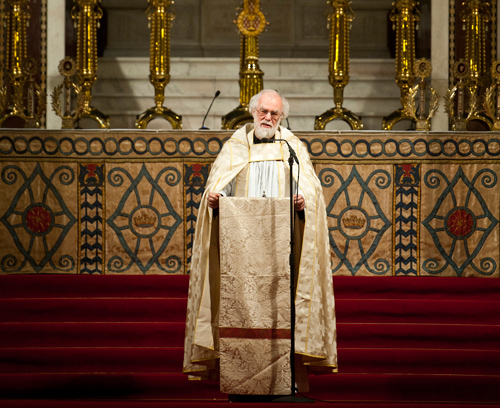Archbishop's homily for the Feast of the Immaculate Conception
 The Archbishop of Westminster and Archbishop of Canterbury. Photo: Marcin Mazur/CCN
The Archbishop of Westminster and Archbishop of Canterbury. Photo: Marcin Mazur/CCNFriday 7th December 2012
Archbishop Rowan Williams delivered the homily at the First Vespers of the Feast of the Immaculate Conception in Westminster Cathedral on 7th December 2012.A transcript of the homily follows, or listen to an audio recording [14Mb, 15 mins].
May I first of all express my warmest thanks to you Archbishop Vincent and to the Chapter here for welcoming me, once again, to this wonderful building and to a share in the worship of almighty God here. I shall take from this place many treasured memories of deep and abiding friendship.
In the name of the Father and of the Son and of the Holy Spirit, Amen.
Blessèd were the chosen people
out of whom the Lord did come;
blessèd was the land of promise
fashioned for his earthly home;
– words that may be familiar to some who’ve experienced worship in the Anglican tradition. One of the great Marian hymns of modern Anglicanism – ‘Ye who own the faith of Jesus’, a hymn that reminds us of what today’s feast is all about: God has prepared for the coming of Christ. (A feast which, incidentally, appears simply as ‘The Conception of the Blessed Virgin Mary’ in the Church of England Book of Common Prayer as well as in other places throughout Anglican Communion.)
The birth of Jesus is not something that happens, so to speak, by God dropping his Word out of a clear sky. It is indeed the beginning of something radically fresh, a new creation. But at the same time it has been coming to birth since the every beginning of creation. The Word who was in the beginning with God is always moving towards Bethlehem to be born, and God prepares the way. God prepares through the graces and gifts of the First Covenant; through the lives of the holy people of that covenant; and above all in the birth and the life of the Virgin Mary. God is—all the time—making a space into which his Word Incarnate may come.
You’ll be familiar with the imagery of the Jesse tree that you sometimes see in stained-glass windows. In my old diocese of Monmouth it was represented in the parish church of Abergavenny by an enormous wooden sculpture of Jesse fast asleep. During the Middle Ages, a great branching wooden sculpture grew from that sleeping figure showing all the saints of Jesse’s line culminating in the Virgin. We could say that if you cut through that tree at any point it would be the same sap flowing, the same life, the life of God preparing a space for his Incarnate Word to come.
It’s sometimes a help in reading the odder portions of the Old Testament to think that wherever we cut through the history of the Covenant God is at work, however unlikely it seems on the surface. Thisbit of ritual regulation in Leviticus or that bit of unedifying tribal history in Judges is all part of the same story, the same making space for the Word Incarnate. In our reading this evening (from St Paul to the Romans 8.28—35, 37—40) our attention was directed to God’s choice before all ages, not only of the path towards the Incarnation but of the path beyond the Incarnation: the path of holiness into which we are drawn. Those called according to God’s purpose are the ones he chose to become true images of his Son. We are part of the same history of God’s work in the human heart, God’s work preparing and then honouring that space he has made for his Son to become flesh. In other words this feast is a feast of God’s faithfulness, a feast of a God who keeps his promise.
Now if we ask a bit more about the nature of God’s promise we might perhaps turn to the very end of St Matthew’s gospel where Jesus makes the greatest promise of all to his disciples: ‘I am with you always to the end of the age’ (Matthew 28.20). Approaching that with today’s celebrations in mind we can be confident that this is a promise that Christ keeps. He is with his disciples; he is with his friends to the end of the world. And just as in the stranger and less edifying bits of the Old Testament we can discern God making his way towards Bethlehem, so even in the estranger and odder bits of our lives as Christians, both individually and together, we can discern a God making his way towards full presence and free grace.
 Jesus has promised that he will always be with those he calls his friends (John 15.15): those he calls to himself in baptism and establishes with him as sons and daughters of his eternal Father. And so we, who share baptism in the name of the Father and of the Son and of the Holy Spirit, may be confident that Jesus has promised to be with us – to be with the other who shares that baptism however unlikely, however difficult that other may be. And when we’re tempted to talk of an ‘ecumenical winter’, tempted to focus our attention only on the stresses and conflicts between communions of Christian churches, it’s worth remembering that our God is a God who keeps his promise and that he has promised to be with us. He has promised to be with that unlikely, difficult Christian stranger with whom we strive to enter into dialogue every bit as much as he has promised to be with us, equally strange and difficult as we are going to seem to some of our brothers or sisters.
Jesus has promised that he will always be with those he calls his friends (John 15.15): those he calls to himself in baptism and establishes with him as sons and daughters of his eternal Father. And so we, who share baptism in the name of the Father and of the Son and of the Holy Spirit, may be confident that Jesus has promised to be with us – to be with the other who shares that baptism however unlikely, however difficult that other may be. And when we’re tempted to talk of an ‘ecumenical winter’, tempted to focus our attention only on the stresses and conflicts between communions of Christian churches, it’s worth remembering that our God is a God who keeps his promise and that he has promised to be with us. He has promised to be with that unlikely, difficult Christian stranger with whom we strive to enter into dialogue every bit as much as he has promised to be with us, equally strange and difficult as we are going to seem to some of our brothers or sisters.
The history of the Church—like the history of the chosen people out of whom the Lord should come—is not a uniform history of holiness, success and edification – not then, and not now. But this is the human family in which Jesus has promised to be present. And when we celebrate a God who is faithful to his promise our hearts are renewed in hope and understanding together. In our meetings, in our discussions, and, yes, even in our conflicts, just as in the history of the people of the first covenant, so now God is deeply and invisibly is making a space into which the life of his Son may come.
When we pray, when we open ourselves to God, we open ourselves to a depth that is already given in our own hearts, open ourselves to that relationship already given in our baptism whereby we are able to call God, ‘Abba, Father!’ because we are brought into the fellowship of the Son. We open our hearts in silence to that depth so that we may become more aware not only of Jesus who has promised to be with us and in us, but so that we may become more and more aware of Jesus who has promised to be in and with our Christian neighbour, our brother and sister. Without that dimension, ecumenical relations are always going to be a matter of mere politeness. With that dimension an element of Spirit-filled and Spirit-fuelled hope enters in.
The God who keeps his promises is the God who is already making his Church one, the God who is already alerting us to the one, Jesus, who has promised to be faithfully present in the neighbour and the stranger. God began to prepare the way from the very first beginnings of creation. God began to prepare the way in the covenant with Abraham, in the Exodus in the anointing of King David, above all on the very eve of the incarnation he prepares the way in the holy life of the Virgin Mary. And as in the body of Mary Christ grew, silently and secretly for nine months, so now in the history of our Church, in the life of each person seeking to be a believer, Christ grows silently, unseen, yet powerfully and faithfully.
Our call to holiness is a call quite simply to let that promise and that faithfulness take us over, permeate every aspect of our being, shape our relationships with one another – within our own Christian families, between our Christian families. And as we grow into that divine faithfulness, as that holy promise shapes our lives, we learn to say with greater and greater clarity and conviction the words with which this evening’s reading ends: ‘Not any power or height or depth nor any created thing can ever come between us and the love of God made visible in Christ Jesus our Lord’ (Romans 8.30).
There could be no more powerful affirmation of the promises of God, the faithfulness of God, what God achieves in that history whereby he prepares the way for his Incarnate Son, and what God is achieving silently and secretly now, even as we speak, even as we pray, even here in this still evening.
Dear brothers and sisters, the vision that I believe we are called to today in the relations between our Churches—between us as individuals, and with God in his wider world—is a vision of Christ keeping his promise, and our calling is to turn away from everything that makes us blind to, or insensitive to that promise, so that divine faithfulness may be the rationale and the inspiration of all we do and say together.
In the life and the child-bearing of the Blessed Virgin Mary that promise first, and once-and-for-all, came to fruition in our history. In our lives and our prayers that promise continues to move towards our own particular Bethlehems, our own particular future as sons and daughters of the everlasting Father. The Spirit moves in us; the Spirit is bringing Christ to birth in us; the Spirit is directing our hearts our eyes and our ears to one another, and to the Christ who has promised to be there. And no created thing can ever come between us and the love of God made visible in Christ Jesus our Lord.
© Rowan Williams 2012

The Archbishop of Canterbury delivering the homily at Westminster Cathedral. Photo: Marcin Mazur/CCN
